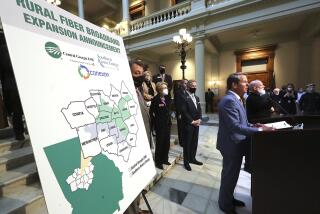White House Briefs Governors on Plan to Turn Over Some Programs to States : Budgets: Flexibility, not cost-cutting, is the reason given for shifting some powers away from the federal government.
- Share via
WASHINGTON — White House Chief of Staff John H. Sununu tried to reassure the nation’s governors Sunday that President Bush’s proposed shifting of federal programs to the states will give them the flexibility they want without shortchanging them.
“They understand now that it is not designed to save one cent in federal spending,” Sununu told reporters after a 90-minute, closed meeting with 45 governors as the National Governors’ Assn. winter meeting got under way here.
“All we want to do is give the states more flexibility,” said Sununu, referring to Bush’s proposal, mentioned in his State of the Union address last week, to “turn over” to states perhaps $15 billion along with responsibility for the programs the money supports.
“We will do what (the governors) need to do to feel comfortable,” added Sununu, who was governor of New Hampshire before taking his current post. “We’re committed to the fact that, whether they are funded under the old way or combined into a block grant, the same dollars go with those programs.”
Governors of both parties appeared to react favorably to the idea of gaining control of the financing of programs in areas such as education and the environment.
“I think it could be a plus, if properly done,” said Washington Gov. Booth Gardner, a Democrat and chairman of the governors association. The Administration, he added, seems to be “sincere about this.”
All governors are attracted by the chance the plan offers them, in theory at least, to shift funds from one program to another according to the needs of their individual states.
Nevertheless, most remain cautious. Details of the plan still have to be hammered out after consultation with the National Council of State Legislatures, and, of course, with members of Congress, whose attitude remains to be seen.
“There are a great many in Congress who understand the wisdom of this approach,” said Republican Gov. Pete Wilson of California, a former senator. “But there is certainly an abiding mentality in the Congress that is unwilling to give up the power of the purse and the power to micromanage.”
In addition, many governors are wary because, they say, program shifts in the past have forced states to scrape for funds to cover the costs of such added responsibilities.
And some governors are skeptical about the net value of the Bush plan, given the overall restrictions on spending for domestic programs ratified by Congress in last year’s five-year budget agreement.
They contend that it is inevitable that the spending ceiling ultimately will force Congress to make cuts in domestic programs, including programs turned over to the states.
“They say you are going to get discretion,” New Jersey Gov. Jim Florio, a Democrat, told a reporter. “But if it turns out to be discretion over apportioning the pain, you have to worry about that. It’s like trying to get 10 pounds of potatoes into a five-pound bag.”
The $15-billion proposal represents little more than 1% of the $1.4-trillion federal budget the President will submit to Congress today. The plan also is dwarfed by the fiscal problems of some states. For example, the states’ outlays for Medicaid--blamed by governors as a principal cause of their current budget squeeze--are expected to rise to $33 billion a year by 1995.
“I think (the Bush plan) is basically an effort to rearrange the furniture,” scoffed Brad Johnson, Washington representative of New York’s Democratic Gov. Mario M. Cuomo, who stayed at home to deal with his state’s budget deficit.
“It’s a distraction to keep people from talking about the recession.”
More to Read
Get the L.A. Times Politics newsletter
Deeply reported insights into legislation, politics and policy from Sacramento, Washington and beyond. In your inbox twice per week.
You may occasionally receive promotional content from the Los Angeles Times.










